| Listing 1 - 10 of 10 |
Sort by
|
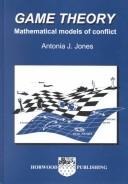
ISBN: 0857099698 1898563144 9780857099693 9781898563143 Year: 2000 Publisher: Chichester [England]
Abstract | Keywords | Export | Availability | Bookmark
 Loading...
Loading...Choose an application
- Reference Manager
- EndNote
- RefWorks (Direct export to RefWorks)
Written engagingly and with agreeable humour, this book balances a light touch with a rigorous yet economical account of the theory of games and bargaining models. It provides a precise interpretation, discussion and mathematical analysis for a wide range of "game-like? problems in economics, sociology, strategic studies and war.There is first an informal introduction to game theory, which can be understood by non-mathematicians, which covers the basic ideas of extensive form, pure and mixed strategies and the minimax theorem. The general theory of non-cooperative games is then given a
Game theory. --- Games, Theory of --- Theory of games --- Mathematical models --- Mathematics
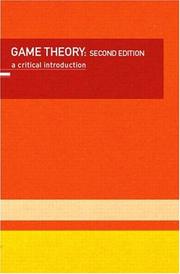
ISBN: 0415094038 9780415094030 Year: 2000 Publisher: London: Routledge,
Abstract | Keywords | Export | Availability | Bookmark
 Loading...
Loading...Choose an application
- Reference Manager
- EndNote
- RefWorks (Direct export to RefWorks)
519.83 --- #SBIB:303H64 --- #SBIB:303H15 --- #SBIB:35H006 --- #SBIB:IO --- 519.83 Theory of games --- Theory of games --- Speltheorie --- Methoden en technieken van de bestuurswetenschappen --- Bestuurswetenschappen: theorieën --- Game theory --- Social sciences --- Games, Theory of --- Mathematical models --- Mathematics --- Operational research. Game theory --- Quantitative methods (economics) --- Game theory. --- Mathematics. --- Social sciences - Mathematics --- Social sciences - Mathematics.
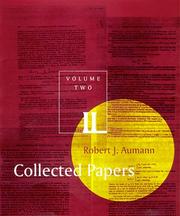
ISBN: 0262011549 0262011557 9780262011549 9780262011556 Year: 2000 Publisher: Cambridge (Mass.): MIT Press,
Abstract | Keywords | Export | Availability | Bookmark
 Loading...
Loading...Choose an application
- Reference Manager
- EndNote
- RefWorks (Direct export to RefWorks)
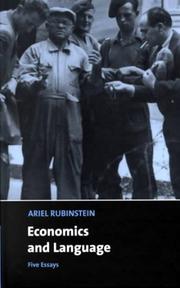
ISBN: 0521593069 0521789907 0511020643 0511492359 1280153237 0511324952 0511152264 0511054378 0511116772 110711442X 9780511020643 0511039131 9780511039133 9780511054372 9780511116773 9780511492358 9781280153235 9786610153237 661015323X 9780521593069 9780521789905 Year: 2000 Publisher: Cambridge Cambridge University Press
Abstract | Keywords | Export | Availability | Bookmark
 Loading...
Loading...Choose an application
- Reference Manager
- EndNote
- RefWorks (Direct export to RefWorks)
Arising out of the author's lifetime fascination with the links between the formal language of mathematical models and natural language, this short book comprises five essays investigating both the economics of language and the language of economics. Ariel Rubinstein touches the structure imposed on binary relations in daily language, the evolutionary development of the meaning of words, game-theoretical considerations of pragmatics, the language of economic agents and the rhetoric of game theory. These short essays are full of challenging ideas for social scientists that should help to encourage a fundamental rethinking of many of the underlying assumptions in economic theory and game theory. As a postscript two economists, Tilman Borgers (University College London) and Bart Lipman (University of Wisconsin, Madison), and a logician, Johan van Benthem (University of Amsterdam, Institute for Logic, Language and Computation and Stanford University, Center for the Study of Language and Information) offer comments.
Linguistics --- Economics --- Game theory. --- Games, Theory of --- Theory of games --- Mathematical models --- Mathematics --- Economic theory --- Political economy --- Social sciences --- Economic man --- Language. --- Game theory --- Language --- Business, Economy and Management --- Théorie des jeux --- E-books --- Economics - Language
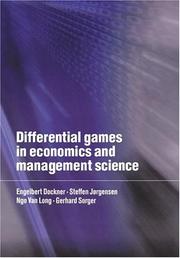
ISBN: 0521637325 0521631254 1316042510 0511805128 9780521637329 9780521631259 9780511805127 Year: 2000 Publisher: Cambridge Cambridge University Press
Abstract | Keywords | Export | Availability | Bookmark
 Loading...
Loading...Choose an application
- Reference Manager
- EndNote
- RefWorks (Direct export to RefWorks)
A comprehensive, self-contained survey of the theory and applications of differential games, one of the most commonly used tools for modelling and analysing economics and management problems which are characterised by both multiperiod and strategic decision making. Although no prior knowledge of game theory is required, a basic knowledge of linear algebra, ordinary differential equations, mathematical programming and probability theory is necessary. Part One presents the theory of differential games, starting with the basic concepts of game theory and going on to cover control theoretic models, Markovian equilibria with simultaneous play, differential games with hierarchical play, trigger strategy equilibria, differential games with special structures, and stochastic differential games. Part Two offers applications to capital accumulation games, industrial organization and oligopoly games, marketing, resources and environmental economics.
Planning (firm) --- Operational research. Game theory --- Economics --- Game theory --- Differential games --- Econometric models --- Management --- 658.012 --- 33 --- 518.5 --- 330.015195 --- Administration --- Industrial relations --- Organization --- Econometrics --- Mathematical models --- Games, Differential --- Games, Theory of --- Theory of games --- Mathematics --- Planning in het bedrijf --- Economie --- Operationeel onderzoek. Speltheorie --- Business, Economy and Management --- Game theory. --- Differential games. --- Econometric models. --- Management.
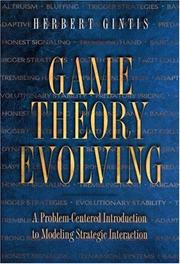
ISBN: 0691009430 0691009422 9780691009438 Year: 2000 Publisher: Princeton (N.J.): Princeton university press,
Abstract | Keywords | Export | Availability | Bookmark
 Loading...
Loading...Choose an application
- Reference Manager
- EndNote
- RefWorks (Direct export to RefWorks)
Operational research. Game theory --- Game theory --- Economics, Mathematical --- Théorie des jeux --- Mathématiques économiques --- 519.8 --- 518.5 --- Economics --- Mathematical economics --- Econometrics --- Mathematics --- Games, Theory of --- Theory of games --- Mathematical models --- Operational research --- Operationeel onderzoek. Speltheorie --- Methodology --- Economics, Mathematical. --- Game theory. --- 519.8 Operational research --- Théorie des jeux --- Mathématiques économiques
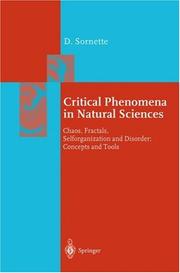
ISBN: 3540674624 3662041766 366204174X Year: 2000 Publisher: New York, NY ; Berlin : Springer-Verlag,
Abstract | Keywords | Export | Availability | Bookmark
 Loading...
Loading...Choose an application
- Reference Manager
- EndNote
- RefWorks (Direct export to RefWorks)
Concepts, methods and techniques of statistical physics in the study of correlated, as well as uncorrelated, phenomena are being applied ever increasingly in the natural sciences, biology and economics in an attempt to understand and model the large variability and risks of phenomena. This is the first textbook written by a well-known expert that provides a modern up-to-date introduction for workers outside statistical physics. The emphasis of the book is on a clear understanding of concepts and methods, while it also provides the tools that can be of immediate use in applications. Although this book evolved out of a course for graduate students, it will be of great interest to researchers and engineers, as well as to post-docs in geophysics and meteorology.
Critical phenomena (Physics) --- Critical phenomena (Physics). --- Statistical physics. --- Dynamical systems. --- Game theory. --- Earth sciences. --- Complex Systems. --- Game Theory, Economics, Social and Behav. Sciences. --- Earth Sciences, general. --- Statistical Physics and Dynamical Systems. --- Geosciences --- Environmental sciences --- Physical sciences --- Games, Theory of --- Theory of games --- Mathematical models --- Mathematics --- Dynamical systems --- Kinetics --- Mechanics, Analytic --- Force and energy --- Mechanics --- Physics --- Statics --- Mathematical statistics --- Statistical methods
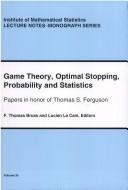
ISBN: 094060048X Year: 2000 Volume: 35 Publisher: Beachwood, Ohio : Institute of Mathematical Statistics,
Abstract | Keywords | Export | Availability | Bookmark
 Loading...
Loading...Choose an application
- Reference Manager
- EndNote
- RefWorks (Direct export to RefWorks)
Game theory --- Optimal stopping (Mathematical statistics) --- Mathematical statistics --- Mathematics --- Physical Sciences & Mathematics --- Algebra --- Statistical inference --- Statistics, Mathematical --- Statistics --- Probabilities --- Sampling (Statistics) --- Stopping, Optimal (Mathematical statistics) --- Sequential analysis --- Games, Theory of --- Theory of games --- Mathematical models --- Statistical methods --- Théorie des jeux --- Arrêt optimal (Statistique mathématique) --- Statistique mathématique --- Ferguson, Thomas S.
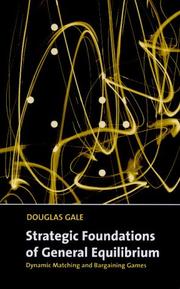
ISBN: 0521644100 0521643309 0511011164 0511152248 0511117442 0511051883 1280153768 051131101X 0511492316 1107116597 9780511011160 9780511117442 9780511492310 9780511051883 9780511152245 9781280153761 9780521644105 9780521643306 Year: 2000 Publisher: Cambridge Cambridge University Press
Abstract | Keywords | Export | Availability | Bookmark
 Loading...
Loading...Choose an application
- Reference Manager
- EndNote
- RefWorks (Direct export to RefWorks)
The theory of competition has held a central place in economic analysis since Adam Smith. This book, written by one of the most distinguished of contemporary economic theorists, reports on a major research program to provide strategic foundations for the theory of perfect competition. Beginning with a concise survey of how the theory of competition has evolved, Gale makes extensive and rigorous use of dynamic matching and bargaining models to provide a more complete description of how a competitive equlibrium is achieved. Whereas economists have made use of a macroscopic description of markets in which certain behavioral characteristics, such as price-taking behavior, are taken for granted, Gale uses game theory to re-evaluate this assumption, beginning with individual agents and modelling their strategic interaction. A strategic foundation for competitive equilibrium shows how such interaction leads to competitive, price-taking behavior. Essential reading for graduate courses in game theory and general equilibrium.
Game theory --- Competition --- Equilibrium (Economics) --- Competition. --- Game theory. --- Management --- Business & Economics --- Management Styles & Communication --- Business, Economy and Management --- Economics --- AA / International- internationaal --- 380.22 --- 305.6 --- Concurrentie. Monopolie, duopolie, oligopolie. --- Risicotheorie, speltheorie. Risicokapitaal. Beslissingsmodellen. --- Games, Theory of --- Theory of games --- Disequilibrium (Economics) --- Economic equilibrium --- General equilibrium (Economics) --- Partial equilibrium (Economics) --- Competition (Economics) --- Competitiveness (Economics) --- Economic competition --- Economic aspects --- Mathematical models --- Mathematics --- DGE (Economics) --- DSGE (Economics) --- Dynamic stochastic general equilibrium (Economics) --- SDGE (Economic theory) --- Statics and dynamics (Social sciences) --- Commerce --- Conglomerate corporations --- Covenants not to compete --- Industrial concentration --- Monopolies --- Open price system --- Supply and demand --- Trusts, Industrial --- Concurrentie. Monopolie, duopolie, oligopolie --- Risicotheorie, speltheorie. Risicokapitaal. Beslissingsmodellen
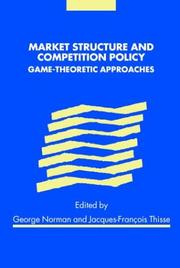
ISBN: 052178333X 110740326X 0511118805 0511041039 0511153236 0511325126 051149257X 1280154799 051104643X 1107120934 9780511041037 9780521783330 9780511046438 9780511118807 9781280154799 9786610154791 6610154791 9781107120938 9780511153235 9780511325120 9780511492570 9781107403260 Year: 2000 Publisher: Cambridge Cambridge University Press
Abstract | Keywords | Export | Availability | Bookmark
 Loading...
Loading...Choose an application
- Reference Manager
- EndNote
- RefWorks (Direct export to RefWorks)
This 2000 text applies modern advances in game theory to the analysis of competition policy and develops some of the theoretical and policy concerns associated with the pioneering work of Louis Phlips. Containing contributions by leading scholars from Europe and North America, this book observes a common theme in the relationship between the regulatory regime and market structure. Since the inception of the new industrial organization, economists have developed a better understanding of how real-world markets operate. These results have particular relevance to the design and application of anti-trust policy. Analyses indicate that picking the most competitive framework in the short run may be detrimental to competition and welfare in the long run, concentrating the attention of policy makers on the impact on the long-run market structure. This book provides essential reading for graduate students of industrial and managerial economics as well as researchers and policy makers.
519.83 --- 681.3*I68 --- 338.516 --- 339.13 --- concurrentie --- markt, internationaal --- speltheorieën --- Competition --- -Industrial policy --- -Game theory --- Games, Theory of --- Theory of games --- Mathematical models --- Mathematics --- 339.13 Marktmechanisme. Markttheorie. Marktstructuur. Marktregulatietechnieken. Marktevenwicht. Disequilibrium van de markt. Marktfluctuatie. Marktelasticiteit. Oneerlijke concurrentie. Dumping. Antidumping --- Marktmechanisme. Markttheorie. Marktstructuur. Marktregulatietechnieken. Marktevenwicht. Disequilibrium van de markt. Marktfluctuatie. Marktelasticiteit. Oneerlijke concurrentie. Dumping. Antidumping --- 519.83 Theory of games --- Business --- Industries --- Industry and state --- Economic policy --- Competition (Economics) --- Competitiveness (Economics) --- Economic competition --- Commerce --- Conglomerate corporations --- Covenants not to compete --- Industrial concentration --- Monopolies --- Open price system --- Supply and demand --- Trusts, Industrial --- 338.516 Markt als prijsmechanisme. Marktmechanisme. Marktprijs. Vrije concurrentie. Monopolistische concurrentie. Oligipolie. Duopolie. Marginale prijsvorming --groothandel-kleinhandelprijs zie {339.3} --- Markt als prijsmechanisme. Marktmechanisme. Marktprijs. Vrije concurrentie. Monopolistische concurrentie. Oligipolie. Duopolie. Marginale prijsvorming --groothandel-kleinhandelprijs zie {339.3} --- Computerwetenschap--?*I68 --- Government policy --- -Mathematical models --- Economic aspects --- Phlips, Louis --- Phlips, Louis. --- Business, Economy and Management --- Philips, Louis --- Phlips, L. --- Game theory --- Industrial policy --- Government policy&delete& --- Economic analysis of law --- Economic law --- Game theory. --- Mathematical models. --- Economics --- Competition - Government policy - Mathematical models --- Industrial policy - Mathematical models
| Listing 1 - 10 of 10 |
Sort by
|

 Search
Search Feedback
Feedback About UniCat
About UniCat  Help
Help News
News